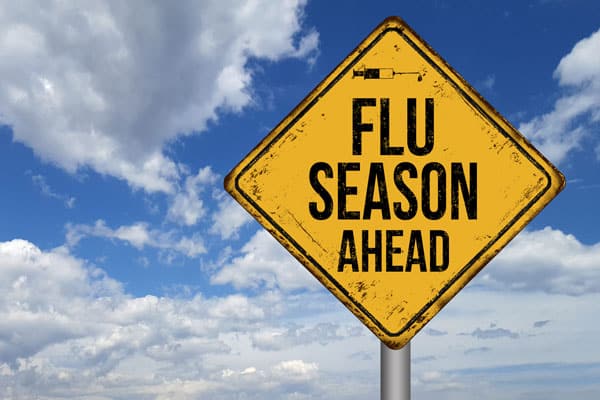Should I Get a Flu Shot in February to Lower My Risk of Influenza?

As flu season continues, here are some things you can do to reduce your risk of infection and protect those around you.
When is the best time to get an influenza vaccination?
Ideally, it’s best to get vaccinated before influenza begins to spread in your community. According to the Centers for Disease Control and Prevention (CDC), most people should try to get their annual flu vaccine by the end of October.
However, influenza vaccination is recommended throughout the flu season. Flu season most commonly peaks in February and can remain active into early spring.
Why should I get a flu shot in February?
Despite our best intentions, it’s easy to forget our annual vaccinations. Don’t despair or remain unprotected. Here are three good reasons to go ahead and get your flu shot:
- Flu season does not adhere to a strict calendar.
Flu season tends to peak around a similar time each year, but it doesn't circulate on a fixed schedule. Strains of influenza can emerge and extend the flu season longer than expected. Influenza strains can also vary in transmissibility and severity from year to year.Statistics show that influenza and its complications lead to thousands of flu-related deaths each year.
- Vaccines can reduce the risk of influenza illness and complications.
Besides causing severe illness, influenza can cause serious complications for individuals with chronic health conditions. Even in otherwise healthy people, influenza can result in bacterial pneumonia and sinus infections that require additional medical intervention.The flu vaccine is a simple and effective way to reduce the risk and complications of influenza. According to CDC information, flu vaccines have reduced the risks associated with influenza between 40% and 60%.
- Vaccines help protect you and others – It’s the right thing to do!
Getting a flu shot also protects the people around you. The concept of herd immunity holds that people who are immunized significantly reduce virus spread and help keep their community safe by limiting the number of people who can contract the illness.Because the flu virus can spread quickly, getting your flu vaccine is critical to minimizing the risk of influenza for you and those around you.
How can I further lower my risk of getting the flu?
The flu vaccine is your best defense against the flu. However, there are additional steps you can take to help protect yourself from the flu and other viruses, including COVID-19. These steps include:
- Wash your hands often and thoroughly with soap and water for at least 20 seconds.
- Use an alcohol-based sanitizer on your hands if soap and water aren't available.
- Avoid touching your eyes, nose, or mouth.
- Avoid crowds when the flu and other illnesses are actively spreading in your area.
- Avoid being in close contact with others who are sick.
- Cover your mouth when you cough or sneeze, and then wash your hands. A tissue or the bend in your arm are good alternatives to bare hands.
- Regularly clean and disinfect commonly touched surfaces, such as counters, light switches, and doorknobs. Doing so can reduce the spread of germs from contaminated objects.
- Stay home when you are sick. Preventing the spread of all illnesses is paramount to everyone’s health, especially during flu season.
- Practice good health habits. Get regular exercise, sleep well, drink plenty of fluids, eat a healthy diet, and manage stress and other health conditions.
Are you ready to schedule an appointment for your flu shot?
Consult with your medical provider if you have concerns regarding your health conditions and whether the influenza vaccine is right for you.
If you have questions about the vaccine or want to schedule an appointment, please call the Moultrie County Health Department (MCHD) at (217) 728-4114.
- We offer influenza vaccines for persons six months through adulthood.
- High-dose influenza vaccines are available for individuals 65 and older.
- We bill Medicare, Medicaid, and most private insurance carriers.
Remember: It’s still up to YOU to prevent the FLU!

